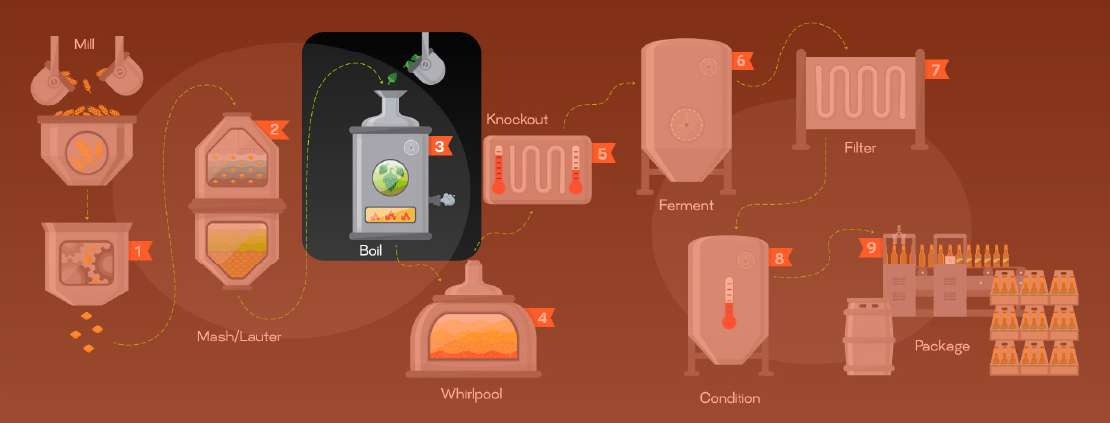1. The Importance of Steam Boilers in the Brewing Process
Understanding the Role of Steam Boilers
In the world of brewing, steam boilers play a pivotal role in ensuring the successful execution of the brewing process. Steam boilers are specifically designed to generate steam, which is then used for various applications in brewing, such as heating, boiling, sterilizing, and maintaining precise temperatures during fermentation. The availability of a reliable and efficient steam boiler is crucial for breweries to produce consistent, high-quality beer.
Heat Transfer and Energy Efficiency
Steam boilers are designed to efficiently transfer heat to the brewing process. The heat energy produced by the boiler is used for mashing, boiling, and sterilization, ensuring that the ingredients are properly cooked, flavors are extracted, and the beer is free from harmful microorganisms. The precise control of heat is essential to achieve the desired flavor, aroma, and consistency of the final product.
Steam boilers excel in heat transfer, making them an ideal choice for the brewing industry. Through the combustion of fuels like natural gas, propane, or oil, steam boilers generate high-temperature steam that can be used for heating water, wort, or other brewing ingredients. The heat from the steam is transferred to the brewing process, allowing for efficient and controlled heating.
Energy efficiency is a key consideration in modern breweries, both for cost savings and environmental sustainability. Steam boilers are engineered to maximize energy efficiency, ensuring that the energy input is effectively converted into steam. This not only reduces operational costs but also minimizes greenhouse gas emissions and promotes a greener brewing industry.
Temperature Control and Consistency
Precise temperature control is critical throughout the brewing process to achieve desired enzymatic reactions, yeast activity, and flavor development. Steam boilers provide breweries with a reliable heat source that can be finely regulated to maintain specific temperatures for mashing, boiling, and fermentation. Maintaining precise and consistent temperatures throughout the brewing process is crucial for producing high-quality beer. Steam boilers provide a reliable and controllable heat source, allowing brewers to achieve and maintain the specific temperatures required for mashing, fermentation, and other critical stages. This ensures the enzymatic reactions and yeast activity occur optimally, resulting in the desired flavor profiles and characteristics of the beer.
Different beer styles require specific temperature ranges to bring out their unique characteristics. Whether it’s a crisp lager, a hop-forward IPA, or a complex barrel-aged stout, steam boilers offer breweries the ability to control temperature profiles accurately. This ensures consistency in the brewing process, enabling brewers to replicate their recipes and maintain the flavor profiles that their customers love.
Sterilization and Sanitation
Maintaining a clean and sanitary brewing environment is essential to prevent contamination and ensure the quality and safety of the final product.
Steam boilers play a vital role in the sterilization and sanitation processes within the brewery. Steam is an effective sterilizing agent that can eliminate microorganisms, bacteria, and wild yeast that could otherwise compromise the beer. Cleanliness is of utmost importance in brewing to prevent contamination and maintain the integrity of the beer. Breweries utilize steam boilers to generate steam for cleaning and sanitizing various brewing equipment, such as fermentation vessels, kegs, piping, and other surfaces. The high temperatures of the steam help to kill bacteria and remove any residual flavors or odors, ensuring a hygienic brewing environment.
Reliability and Reducing Downtime
Unplanned downtime can have significant financial implications for breweries. Steam boiler failures can disrupt the brewing process, leading to production delays, batch losses, and potential reputational damage. Therefore, ensuring the reliability of steam boilers is crucial.
By investing in well-maintained and properly serviced steam boilers, breweries can minimize the risk of unexpected failures and downtime. Regular inspections, maintenance, and adherence to industry best practices help identify potential issues early on, allowing for timely repairs or replacements. Implementing a proactive approach to boiler maintenance reduces the chances of breakdowns, thereby increasing operational efficiency and reducing costly interruptions in the brewing process.
Scaling Up and Flexibility
As breweries expand their operations or experiment with new beer styles, the capacity and flexibility of their steam boilers become increasingly important. Steam boilers offer breweries the ability to scale up production without sacrificing quality or consistency.
With the right steam boiler setup, breweries can easily adjust steam production to accommodate increased batch sizes or higher demand. The flexibility of steam boilers allows for efficient and reliable heat transfer across a range of brewing volumes, enabling breweries to meet market demands and explore new avenues for growth.
Energy Efficiency
Steam boilers are designed to be highly efficient in converting fuel into steam. The efficient use of energy is crucial for breweries to minimize operational costs and reduce their environmental impact. By utilizing steam boilers, breweries can optimize their energy consumption and reduce waste, making their brewing process more sustainable and cost-effective.
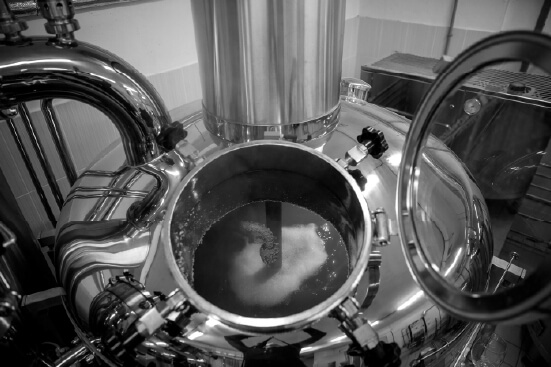
Process Control and Automation
Steam boilers can be integrated into the overall brewing system, allowing for precise control and automation of the brewing process. Advanced control systems can regulate steam production, pressure, and temperature, ensuring consistent and repeatable results batch after batch. This level of control is essential for breweries aiming for consistency in their products and scaling up their production while maintaining quality.
Flexibility and Adaptability
Steam boilers offer breweries flexibility and adaptability in terms of the variety of beer styles they can produce. Different beer styles often require specific brewing processes and temperatures. Steam boilers provide the versatility to adjust heat levels and steam supply to accommodate various recipes and brewing techniques, enabling brewers to experiment and create a diverse range of beers.
2. Causes of Sporadic Steam Boiler Failures
Let’s explore the common causes of sporadic steam boiler failures. We’ll highlight the detrimental effects of poor maintenance practices, such as scale accumulation, corrosion, and sediment buildup, and also address mechanical wear and tear as a result of prolonged usage and the implications of incorrect boiler operation.
Importance of Understanding Boiler Failure Causes
To protect your brewery from unexpected downtime, it is essential to identify and understand the causes of sporadic steam boiler failures. By recognizing these factors, breweries can implement preventative measures to mitigate the risks and ensure uninterrupted brewing operations. This section explores common causes of steam boiler failures and highlights the significance of proactive maintenance and monitoring.
Poor Maintenance and Neglected Inspections
One of the leading causes of steam boiler failures is poor maintenance practices and neglecting regular inspections. Over time, steam boilers accumulate scale, corrosion, and sediment, which can impede their efficiency and ultimately lead to failure. Without proper maintenance, these issues can worsen, resulting in reduced heat transfer, increased energy consumption, and potential catastrophic boiler breakdowns.
To address this, breweries should establish a comprehensive maintenance program that includes regular inspections, cleaning, and servicing of steam boilers. Routine inspections help identify early signs of degradation, such as leaks, corrosion, or damaged components. By promptly addressing these issues, breweries can prevent major failures and ensure the longevity of their steam boilers.
Mechanical Wear and Tear
Steam boilers consist of various components, such as valves, pumps, pressure vessels, and heat exchangers, which are subject to wear and tear over time. Mechanical failures can occur due to factors such as vibration, thermal expansion and contraction, and prolonged stress on specific parts.
Regularly monitoring the condition of these components is crucial to identify signs of wear and tear. Boiler operators should pay attention to unusual noises, vibrations, or leaks, as these may indicate potential mechanical failures. Implementing a preventive maintenance plan that includes lubrication, inspection, and replacement of worn parts can significantly reduce the risk of unexpected boiler failures.
Incorrect Operation and Human Error
Improper boiler operation is another common cause of steam boiler failures. Human error, such as running the boiler at incorrect pressure levels or failing to follow proper start-up and shut-down procedures, can result in severe damage to the boiler system. These errors can lead to issues such as overheating, pressure explosions, or water level imbalances.
To prevent incorrect operation, it is crucial to provide comprehensive training to brewery staff involved in boiler operations. Training programs should cover safe operation procedures, proper pressure and temperature settings, and routine checks to ensure optimal boiler performance. By fostering a culture of responsible boiler operation and empowering employees with the necessary knowledge and skills, breweries can minimize the risk of human-error-related failures.
Water Quality Issues
Water quality plays a significant role in the performance and lifespan of steam boilers. Poor water quality can lead to problems such as scale buildup, corrosion, and sediment deposition. These issues restrict heat transfer, increase energy consumption, and accelerate the deterioration of boiler components.
Breweries should implement regular water quality testing to identify any potential issues. Testing should include analysis of mineral content, pH levels, dissolved oxygen, and other impurities that can negatively impact boiler performance. Based on the water quality assessment, appropriate water treatment solutions, such as filtration, softening, or chemical treatment, can be implemented to maintain optimal boiler performance and prevent premature failures.
Age and Equipment Obsolescence
As steam boilers age, their efficiency and reliability may decline, increasing the likelihood of sporadic failures. Older boiler systems may not meet modern safety standards, leading to higher risks of malfunction or inefficiency. Additionally, outdated equipment may lack advanced monitoring and control features, limiting the ability to identify and address potential issues proactively.
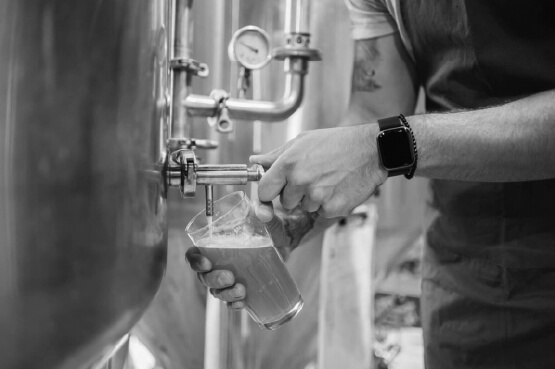
Breweries should evaluate the age and condition of their steam boilers and consider equipment upgrades or replacements when necessary. Upgrading to newer, more efficient boiler systems with enhanced safety features, and advanced monitoring capabilities can significantly reduce the risk of unexpected downtime and improve overall brewing process efficiency.
Understanding the causes of sporadic steam boiler failures is crucial for breweries to protect their operations from unexpected downtime. By addressing poor maintenance practices, monitoring mechanical wear and tear, ensuring correct operation, maintaining water quality, and considering equipment upgrades, breweries can minimize the risks associated with steam boiler failures. Implementing proactive maintenance measures and fostering a culture of responsible boiler operation will help breweries maintain reliable and efficient steam boiler systems, ensuring uninterrupted brewing operations.
3. Monitoring Steam Boilers to Prevent Unexpected Downtime
It is important to proactively monitor steam boilers to prevent unexpected downtime. It includes regular visual inspections to detect visible signs of damage, the installation of pressure and temperature sensors for real-time performance monitoring, and the significance of water quality testing to prevent corrosion and scale buildup.
The Need for Boiler Monitoring
To protect your brewery from unexpected downtime and costly repairs, it is essential to implement a robust monitoring system for your steam boilers. By continuously monitoring key parameters and performance indicators, breweries can detect early signs of potential issues and take proactive measures to prevent failures. Here, we delve into the importance of monitoring steam boilers and explore the various aspects that breweries should consider when implementing a monitoring system.
Real-Time Data Acquisition and Analysis
One of the primary goals of boiler monitoring is to acquire real-time data on critical parameters such as pressure, temperature, water level, and combustion efficiency. Real-time data acquisition allows brewery operators to have a comprehensive understanding of their boiler’s performance and identify any abnormalities or deviations from the optimal operating conditions.
Advanced monitoring systems can provide continuous data streams that can be analyzed in real-time using data analytics tools. By analyzing the data, breweries can identify trends, patterns, and anomalies that may indicate potential issues. This enables proactive decision-making and the ability to take preventive actions to avoid unexpected downtime.
Remote Monitoring and Alert Systems
Remote monitoring capabilities are highly beneficial for breweries with multiple locations or off-site boiler rooms. With remote monitoring, brewery operators can access real-time boiler data and receive alerts on their mobile devices or through centralized monitoring systems. This allows for prompt response to critical situations, even when not physically present at the brewery.
Alert systems can be set up to notify operators when certain parameters exceed predefined thresholds or when abnormalities are detected. Alerts can be sent via email, SMS, or integrated into the brewery’s control systems. By promptly addressing potential issues indicated by alerts, breweries can minimize downtime and reduce the risk of severe boiler failures.
Condition Monitoring Techniques
In addition to monitoring key operating parameters, breweries can employ various condition monitoring techniques to gain deeper insights into the health and performance of their steam boilers. These techniques include:
a. Vibration Analysis: By analyzing vibration patterns, breweries can detect mechanical faults, such as bearing wear or misalignment, which can lead to unexpected failures. Vibration sensors placed strategically on the boiler and associated equipment can provide valuable insights into the condition of the system.
b. Thermography: Infrared thermography allows breweries to identify temperature variations and potential hotspots in the boiler and its components. By detecting abnormal temperature distributions, breweries can address issues such as heat loss, insulation problems, or refractory damage, which can impact boiler efficiency and reliability.
c. Oil Analysis: For boilers with oil-based fuel systems, regular oil analysis can provide insights into the condition of lubricants, identifying potential contaminants or degradation that may affect the performance of critical components such as pumps and motors.
d. Emission Monitoring: Monitoring emissions, such as combustion gases, can help breweries ensure that their boilers are operating within regulatory compliance and combustion efficiency standards. Continuous emission monitoring systems (CEMS) can provide real-time data on emissions, enabling timely adjustments and minimizing environmental impacts.
By incorporating condition monitoring techniques into their boiler monitoring strategy, breweries can gain a comprehensive understanding of their boiler’s health and performance, enabling proactive maintenance and preventing unexpected failures.
Integration with Maintenance Management Systems
Effective boiler monitoring should be integrated with a comprehensive maintenance management system (MMS). By integrating monitoring data with the MMS, breweries can track maintenance activities, schedule preventive maintenance tasks, and maintain a complete history of maintenance records for each boiler.
The MMS can automate the generation of work orders based on predefined maintenance schedules or trigger maintenance tasks based on the condition monitoring data received from the boilers. This integration streamlines the maintenance process, ensures timely interventions, and allows breweries to proactively address any issues identified during the monitoring process.
Continuous Improvement and Data-Driven Decision Making
Boiler monitoring is not a one-time implementation but an ongoing process that requires continuous improvement. Breweries should analyze the collected monitoring data, evaluate the effectiveness of their maintenance practices, and identify areas for optimization.
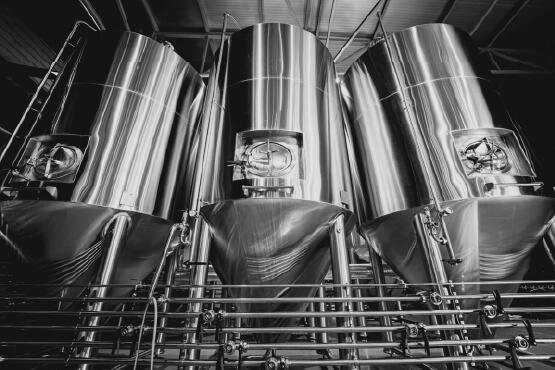
Data-driven decision making plays a vital role in continuously improving the boiler monitoring system. By analyzing historical data, breweries can identify patterns and trends, recognize recurring issues, and develop strategies to mitigate risks and improve boiler performance. This iterative approach enables breweries to refine their monitoring and maintenance practices over time, ultimately enhancing operational efficiency and reducing unexpected downtime.
Implementing a robust monitoring system for steam boilers is essential for breweries to prevent unexpected downtime. By acquiring real-time data, utilizing remote monitoring capabilities, employing condition monitoring techniques, integrating with maintenance management systems, and fostering a culture of continuous improvement, breweries can effectively monitor their steam boilers, detect potential issues in advance, and take proactive measures to ensure uninterrupted brewing operations.
4. Implementing Preventative Maintenance Measures
Knowing what and how to implement preventative maintenance measures for steam boilers will help prevent unforeseen consequences. It requires establishing a routine maintenance schedule encompassing cleaning, descaling, and lubrication tasks. We’ll also talk here about the importance of training brewery staff on proper boiler operation and maintenance procedures and the timely replacement of worn or damaged components.
The Importance of Preventative Maintenance
Preventative maintenance is a proactive approach to ensure the reliability, efficiency, and longevity of steam boilers in breweries. By implementing a comprehensive preventative maintenance program, breweries can minimize the risk of unexpected boiler failures, optimize performance, and reduce downtime.
Establishing a Maintenance Schedule
A well-defined maintenance schedule is the foundation of an effective preventative maintenance program. Breweries should establish a regular maintenance calendar that includes routine inspections, cleaning, and servicing tasks. The frequency of maintenance activities may vary depending on the boiler’s usage, operating conditions, and manufacturer’s recommendations.
Regular inspections involve visually assessing the boiler and its components for signs of wear, corrosion, leaks, or any other abnormalities. Cleaning tasks include removing accumulated scale, sediment, or debris that can hinder boiler performance. Servicing tasks may involve lubricating moving parts, inspecting and tightening electrical connections, and checking safety devices.
Conducting Boiler Efficiency Tests
Periodic boiler efficiency tests are essential to assess the performance of the steam boiler and identify potential areas for improvement. These tests help breweries understand how efficiently their boilers are converting fuel into steam, and if any adjustments or optimizations are necessary.
Boiler efficiency tests typically involve measuring the fuel consumption and steam output over a specified period. The collected data is then used to calculate the boiler’s efficiency and determine its performance relative to its design specifications. By monitoring boiler efficiency regularly, breweries can identify changes in performance and take appropriate actions to optimize fuel usage and improve overall efficiency.
Implementing Component Replacement Programs
Certain boiler components are subject to wear and tear over time. It is crucial for breweries to identify these components and establish replacement programs to prevent unexpected failures. Regular inspections should include assessing the condition of critical components such as valves, pumps, gaskets, and safety devices.
By monitoring the performance of these components and tracking their lifespan, breweries can schedule proactive replacements or repairs before they cause disruptions in the brewing process. Adhering to manufacturer-recommended replacement intervals and using high-quality replacement parts can significantly reduce the risk of sudden component failures.
Training and Education for Boiler Operators
Well-trained boiler operators are key to maintaining boiler health and safety. Breweries should invest in providing comprehensive training programs for their boiler operators to ensure they possess the knowledge and skills required to operate and maintain the steam boilers effectively.
Training should cover essential topics such as boiler operation, maintenance procedures, safety protocols, and emergency response. Operators should understand the correct operating parameters, the significance of monitoring data, and the importance of adhering to maintenance schedules. Ongoing training and education will keep operators updated on industry best practices and new technologies, empowering them to make informed decisions and troubleshoot issues effectively.
Documenting Maintenance Activities
Proper documentation of all maintenance activities is critical for effective preventative maintenance. Breweries should establish a systematic approach to record maintenance tasks, inspections, repairs, and component replacements.
Detailed maintenance logs allow breweries to track the history of each boiler, monitor trends in performance, identify recurring issues, and ensure compliance with regulatory requirements. These records also serve as valuable references for future maintenance, troubleshooting, or equipment upgrades.
Continuous Evaluation and Optimization
To continuously improve their preventative maintenance program, breweries should evaluate its effectiveness and make adjustments as necessary. Regularly review maintenance logs, analyze performance data, and seek feedback from boiler operators and maintenance staff.
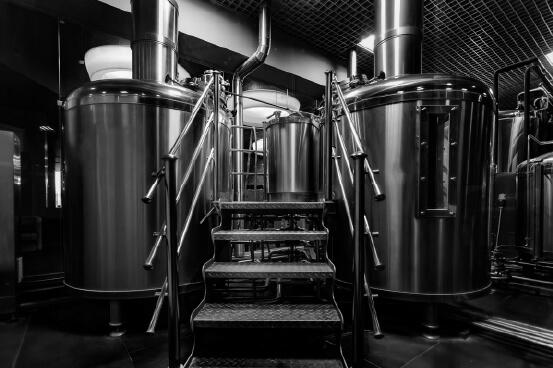
Identify areas for improvement, such as optimizing maintenance intervals, upgrading equipment, or enhancing operator training. Utilize the insights gained from monitoring data and lessons learned from past maintenance activities to refine the preventative maintenance program.
Implementing preventative maintenance measures is essential for breweries to ensure the reliability, efficiency, and longevity of their steam boilers. By establishing a maintenance schedule, conducting boiler efficiency tests, implementing component replacement programs, providing training for boiler operators, documenting maintenance activities, and continuously evaluating and optimizing the program, breweries can minimize the risk of unexpected downtime, improve boiler performance, and maintain uninterrupted brewing operations.



